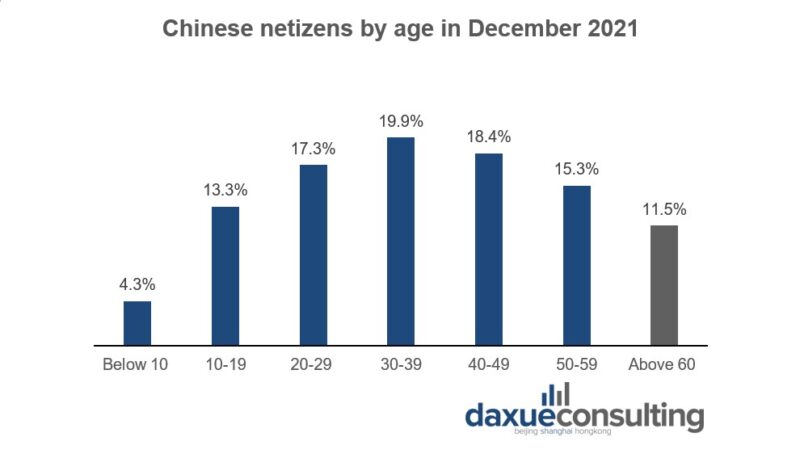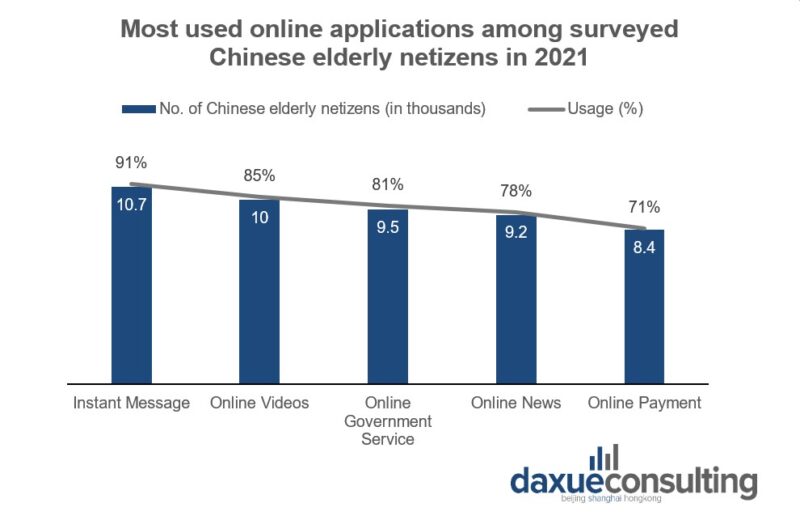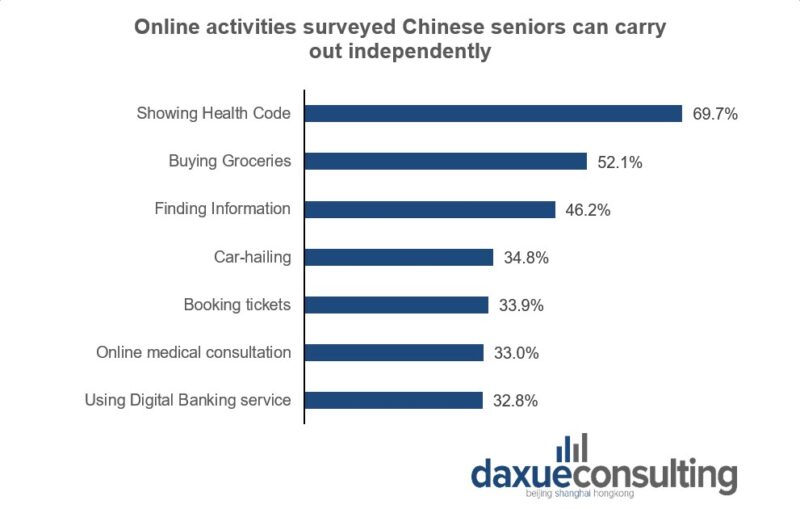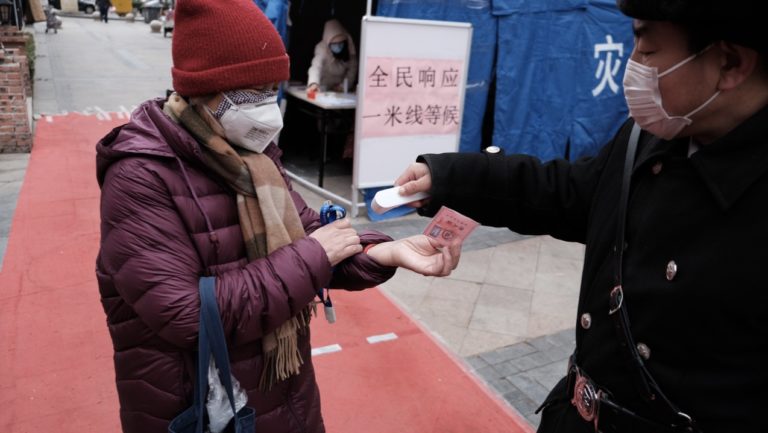OECD said that a country would be considered an “aging society” if the share of people aged 65 years or above exceeds 7%; as an “aged society” if the share exceeds 14%. According to The Seventh National Population Census of the People’s Republic of China, China’s population aged 60 and above accounts for 18.7% of the total population, while the population aged 65 and above reached nearly 200 million and accounts for 13.5%. Hence, China is about to become an “aged society”. However, unlike the past generations where the elderly faced a serious digital divide, elderly people nowadays are “silver surfers”. Against all odds, the elderly play an active role in the internet boom and especially in Chinese e-commerce.
The seniors in China untap a high-potential market online
Seniors in China are already using the internet, and more are likely to go online in the future. According to the 49th China Statistical Report on Internet Development by CNNIC, Chinese netizens over 60 years old reached 119 million as of December 2021, which is increased by 8 million compared with the end of 2020, accounting for 11.5% of the total netizens. Also, the internet penetration rate of the population aged 60 and above reached 43.2%, and it is expected to further grow in the future.

Video platforms are the most popular apps when Chinese elderly use internet for the first time
According to CNNIC, instant messaging tools, video streaming platforms, online government services, news portals and online payment services are the top 5 most used applications by the Chinese elderly. Among all the applications, Chinese silver population tend to scroll online news platforms about 3.2% more often than the overall population, imposing as the only app category that the Chinese elderly use more than other age groups, thus reflecting older netizens’ attention to current affairs.
Moreover, 31.3% of the Chinese senior netizens said they watched online videos during their first approach to new technologies, while 21.5% said they used instant messaging toolsand 8.2% read online news.

Chinese senior netizens can successfully complete basic tasks by themselves
Supported by the Chinese government’s policies, Chinese seniors significantly improved their ability to use online applications independently. According to CNNIC, the top 3 activities that the Chinese elderly could independently complete are showing health code, buying groceries and finding information, accounting for 69.7%, 52.1% and 46.2% respectively. Nevertheless, complex online activities such as car-hailing, booking tickets and online medical consultation remain difficult tasks for many Chinese seniors. Businesses can focus on the pain points of the Chinese elderly and develop ad hoc products meant to improve senior netizens’ customer experience.

WeChat is doing great among Chinese elderly
The willingness to embrace the internet previously mentioned is reflected by the increasing popularity of WeChat among the seniors in China. According to TechNode, over 63 million WeChat users were registered as 55 years old and above by September 2018. Moreover, more than 60% of internet users aged 60+ spent over 50% of their mobile data usage on WeChat. In contrast, the number is significantly lower for the young people aged 18-35 (25%) and slightly lower for Chinese aged 36-60 (50%). Chinese seniors actively share information on WeChat chat groups. Group members can be old school friends, colleagues or even people sharing the same hobby. According to HKTDC, the Chinese elderly share information when they “come across something good”.
Furthermore, WeChat is the most used method of communication for arranging hobbies and activities among the over 50s. Over 80% use WeChat to meet and sing together.
The Chinese government is pushing businesses to invest in attracting elderly consumers
As early as December 2020, the Ministry of Industry and Information Technology stated that it would launch a one-year “Special action for the improvement of internet accessibility for the elderly and disabled”《互联网应用适老化及无障碍改造专项行动》starting from January 2021. The first batch will prioritize the renovation of 115 websites in 8 categories and 43 apps in 6 categories.
The renovated applications covered various scenarios including news, social communications, search engines, shopping, financial services etc. Changes were not only meant to meet the online needs of the elderly group, but they also effectively promote a better relationship between the Chinese elderly and the digital society. As of December 2021, 13.2% of the Chinese elderly have tried the renovated applications and 33.9% of the surveyed seniors heard about the elderly-friendly version of popular applications.
How platforms are making their services elderly-friendly
WeChat became aging-friendly by introducing “Easy Mode” in 2021, where buttons and fonts were enlarged and the colour scheme brightened to make objects more recognisable for the visually impaired. In the latest version, WeChat provided text-reading function: by enabling such functionality, WeChat will read received messages aloud when users click on them so that elderly can understand the text easier.
However, ad blocking and other accessibility functions specialised for elderly are currently not supported in WeChat.

Xiaohongshu
Once being rejected in November 2021, Xiaohongshu’s application for registration of Laohongshu (literally means Old Red Book老红书) has succeeded in January 2022. Xiaohongshu handed in the trademark application in June 2021. It claimed that the registration was a defensive action as there were many malicious third parties trying to register the trademark of Laohongshu pre-emptively.
Yet, it is believed that the application of the new trademark was not merely a defensive action. As early as in June 2021, a new app called Youyou Video, whose production company has an equity relationship with Xiaohongshu, was launched. Youyou Video is believed to be an experimental field for Xiaohongshu to expand to Chinese elderly’s market, as it targets the high-income senior female users and provides them with tailored content including tutorial on how to dress and makeup to look younger.
China’s netizens are looking forward to the launch of Laohongshu.
Key takeaways from the online behaviour of the Chinese elderly
- The Chinese government are supporting the digital inclusion of the Chinese elderly as the country is going to become an aged society very soon.
- Unsurprisingly, WeChat is the top app among the Chinese seniors. Tencent app is therefore a launchpad for businesses eager to capture the Chinese elderly.
- More and more businesses have tapped into the online elderly market. Newcomers should consider solving the problem of helping seniors complete relatively complex activities, such as accessing to financial services and doing online shopping.
Author: Lydia Choi





